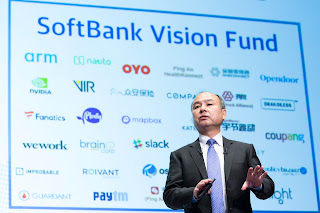Founded in 1981, SoftBank has been one of the backers of start-ups in the United States and globally. After riding the 1990s dot-com boom and bust, SoftBank largely retreated from American shores until the 2010s.
Bad news mounts for Softbank as big bets don't pay off. This giant Japanese conglomerate has been one of the world's largest backers of start-ups.
For the past decade, Softbank and its founder, Masayoshi Son, were mentioned in headlines mainly for the Japanese conglomerate's eye-popping investments, becoming a fixture in the American technology scene by spending freely on start-ups and fundamentally reshaping how such companies had been funded.
There was the world's largest tech investment fund. The billions of dollars pumped into WeWork, the co-working giant. And Mr. Son's splashy purchase of one of Silicon Valley's priciest homes. Now the bad news is piling up.
In the past week, SoftBank planned $40 billion sale of Arm, a chip designer, to Nvidia, the Silicon Valley chip-maker, fell apart because of regulatory setbacks.
Shares in a handful of big tech companies that SoftBank owns stakes in, including the Chinese internet giant Alibaba and DoorDash, the food delivery service, have plunged in recent months amid wider sell-off in high growth tech stocks.
And one of Mr. Son's key deputies, Marcelo Claure, left the company last month after a bitter pay dispute - the latest senior executive to depart in the past year.
The downturn in SoftBank's fortunes was reflected in its latest earnings report. The company said its quarterly earnings fell 97 percent form a year earlier, although it managed to eke out a profit of $251 million during the months that ended on Dec 31.
SoftBan's shares which trade publicly in Tokyo, stayed relatively flat in the past week, although they are already down by more than half in the past 12 months, as investors grow increasingly wary of SoftBan's big bets that haven't paid off.
Mr. Son, who is also SoftBank's chief executive, acknowledged the company's troubles, especially its technology stock holdings.
''The storm has not ended; the storm has gotten stronger,'' he said during an earnings presentation. Still, he remained upbeat, saying SoftBank's latest investments had put it at the center of the artificial intelligence '' revolution .''
SoftBank's performance also reflects the company's transformation in recent years from an operator of companies, mostly in telecommunications, to an investor in so-called disruptive technology companies, said Pierre Ferragu, an analyst at New Street Research.
One of the first signs of Mr. Son's re-emergence came in 2012 when he purchased an estate in Woodside, Calif, for $117 million - one of Silicon Valley's most expensive homes.
He then bought a majority stake in the mobile carrier Sprint in 2013 for roughly $22 billion, installing Mr. Claure as chief executive the next year. Spring later merged with T-Mobile.
By 2017, Mr. Son had raised $100 billion for the Vision Fund, billed as the largest technology fund ever. With nearly half the money coming from Saudi Arabia, it was SoftBank's vehicle for large investments in high-growth tech companies such as Uber, DoorDash and WeWork.
Many of those investments are now struggling in the public markets because investors are selling tech stocks, concerned about interest rates rising soon. When rates go up, they put future growth in doubt, and tech companies, which are all about fast growth, are the first to get hit.
Coupang, South Korea's answer to Amazon, is down nearly 40 percent. Didi, China's ride-hailing company, has fallen even further, down roughly 70 percent - partly because of that country's crackdown on its tech giants.
SoftBank owns stakes in both companies, which trade on U.S. exchanges, although Didi plans to move its listings to Hong Kong. While SoftBank invested far below the initial public offering price of DoorDash, the delivery company - one of the best performing stocks in 2021 - is now trading around its I.P.O. price.
This Publishing continues in the future. The World Students Society thanks author Maureen Farrell.

.png)


0 comments:
Post a Comment
Grace A Comment!